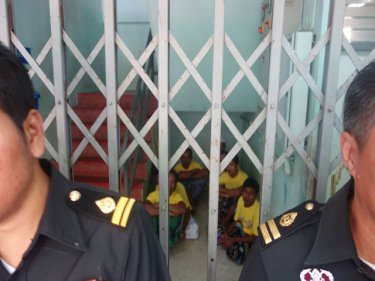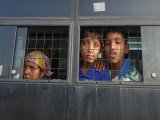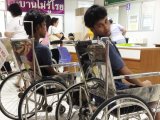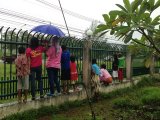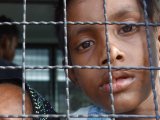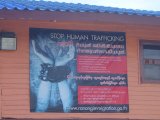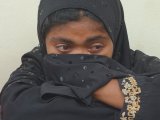PHUKET: A captive Rohingya woman at a family shelter north of Phuket told a government minister today that she was contemplating suicide because no date had been set for her freedom.
''When are we going to be allowed to go to Malaysia?'' the woman asked, in halting Thai language. ''We have no future. It's as though we are dead.''
She was speaking to the Minister for Social Development and Human Security, Paveena Hongsakul, who paid a visit today to the family shelter in Phang Nga where 30 Rohingya women and children are being held.
''We might as well take poison,'' the woman said. ''Our lives are over.'' The Rohingya women at the shelter burst into tears after the minister and her party left this afternoon.
The Phang Nga shelter group is among a reduced number of women and children who remain in captivity after 2000 Rohingya were ''rescued'' from traffickers' camps or apprehended on boats by Thai officials in January.
The Thai Government undertook to resolve their status and futures within a six-month period but that deadline passed on Friday with no decision.
Four Rohingya boys aged five to 13 are back at the shelter after being recaptured late on Wednesday in a ''sting'' operation by Immigration officers.
The officers, through Rohingya contacts, paid an alleged trafficker 10,000 baht for the boys and a 20-year-old woman. The boys were said to be facing sale as ''slaves'' on a Malaysian fishing boat.
The woman - mother of the five-year-old - is being held separately as Immigration officials question her about the alleged trafficking of the group.
Another 12 women and children who fled from the shelter at the same time are believed to have crossed into Malaysia.
One boy escaped from a safe house in Surat Thani where the alleged trafficker was holding the group of 18. The boy's whereabouts are not known.
Numbers at the Phang Nga shelter, in the holiday town of Khao Lak, have been boosted by the arrival of a woman and four children from the government family shelter in Surat Thani.
The other 50 women and children at the shelter have escaped, presumably to Malaysia and probably with the help of traffickers. The woman, mother of the four children, was unable to escape with them.
The minister also visited Phang Nga Immigration centre in Phang Nga Town today, where 261 Rohingya men are being held in appallingly cramped conditions.
The Superintendent of the Phang Nga Immigration Centre, Colonel Neti Kanboon, told the minister that the men held captive there had become anxious and depressed because there was no news about what might happen to them.
The minister said she was keen to know whether traffickers were involved in the escapes from the family shelters and would talk to the Prime Minister, Yingluck Shinawatra, to seek a quick solution.
About 30,000 Rohingya are thought to have fled Burma since June last year when Buddhists in Rakhine state began torching the homes of thousands of Rohingya.
Rohingya men have been fleeing by sea for years but only since the violence have women and children joined them in the flimsy craft that sometimes capsize or are sunk by storms.
An estimated 800 have died at sea trying to escape in the past 12 months.
Numbers of fleeing Rohingya have increased four times on previous sailing seasons and are expected to increase further in the next sailing season, which begins in October.
''When are we going to be allowed to go to Malaysia?'' the woman asked, in halting Thai language. ''We have no future. It's as though we are dead.''
She was speaking to the Minister for Social Development and Human Security, Paveena Hongsakul, who paid a visit today to the family shelter in Phang Nga where 30 Rohingya women and children are being held.
''We might as well take poison,'' the woman said. ''Our lives are over.'' The Rohingya women at the shelter burst into tears after the minister and her party left this afternoon.
The Phang Nga shelter group is among a reduced number of women and children who remain in captivity after 2000 Rohingya were ''rescued'' from traffickers' camps or apprehended on boats by Thai officials in January.
The Thai Government undertook to resolve their status and futures within a six-month period but that deadline passed on Friday with no decision.
Four Rohingya boys aged five to 13 are back at the shelter after being recaptured late on Wednesday in a ''sting'' operation by Immigration officers.
The officers, through Rohingya contacts, paid an alleged trafficker 10,000 baht for the boys and a 20-year-old woman. The boys were said to be facing sale as ''slaves'' on a Malaysian fishing boat.
The woman - mother of the five-year-old - is being held separately as Immigration officials question her about the alleged trafficking of the group.
Another 12 women and children who fled from the shelter at the same time are believed to have crossed into Malaysia.
One boy escaped from a safe house in Surat Thani where the alleged trafficker was holding the group of 18. The boy's whereabouts are not known.
Numbers at the Phang Nga shelter, in the holiday town of Khao Lak, have been boosted by the arrival of a woman and four children from the government family shelter in Surat Thani.
The other 50 women and children at the shelter have escaped, presumably to Malaysia and probably with the help of traffickers. The woman, mother of the four children, was unable to escape with them.
The minister also visited Phang Nga Immigration centre in Phang Nga Town today, where 261 Rohingya men are being held in appallingly cramped conditions.
The Superintendent of the Phang Nga Immigration Centre, Colonel Neti Kanboon, told the minister that the men held captive there had become anxious and depressed because there was no news about what might happen to them.
The minister said she was keen to know whether traffickers were involved in the escapes from the family shelters and would talk to the Prime Minister, Yingluck Shinawatra, to seek a quick solution.
About 30,000 Rohingya are thought to have fled Burma since June last year when Buddhists in Rakhine state began torching the homes of thousands of Rohingya.
Rohingya men have been fleeing by sea for years but only since the violence have women and children joined them in the flimsy craft that sometimes capsize or are sunk by storms.
An estimated 800 have died at sea trying to escape in the past 12 months.
Numbers of fleeing Rohingya have increased four times on previous sailing seasons and are expected to increase further in the next sailing season, which begins in October.

